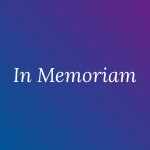Louise Hanson Marshall

Louise Hanson Marshall, Ph.D., died Saturday, July 12, 2003, at the age of 94. She was director emeritus of the UCLA Neuroscience History Archives and has been involved with the Brain Research Institute (BRI) since 1975.
As Allan Tobin, Director of BRI, noted in his nomination of Marshall for the Women in Neuroscience (WIN) Special Recognition Award, “Louise has been a great friend to the neuroscience community both nationally and at UCLA, and she epitomized a spirit of continuing inquiry.”
The Neuroscience History Archives (NHA) began when Marshall and Horace "Tid" Magoun established the Neuroscience History Resource Program (NHRP) at UCLA in 1980, which evolved into the Neuroscience History Archives (www.neurosciencearchives.org). For many years Marshall worked full-time as Director of the NHA without taking salary or compensation. It was only at the age of 92 that she chose to reduce her work hours and take the role of Director Emerita, turning over the reins to Dr. Joel Braslow.
Marshall's many achievements include the recent publication of American Neuroscience in the Twentieth Century by Horace W. Magoun, which she edited and compiled from Dr. Magoun's papers, and the 1998 publication of “Discoveries in the Human Brain: Neuroscience Prehistory, Brain Structure, and Function,” co-authored by Marshall and Horace W. Magoun. Just before her death, Marshall completed a biographical tribute on Horace W. Magoun for the National Academy of Sciences.
In 2002, Marshall was a recipient of the Lifetime Contribution Award from the International Society for the History of the Neurosciences, at the Eighth Annual meeting of the ISHN, held on the UCLA campus. In 2001, Marshall was the first recipient of the Women in Neuroscience Special Recognition Award. In the citation accompanying that honor, it was noted that she had "...sequentially, three complete scientific careers on top of a rich personal and family life: first, as a physiologist; second, as a facilitator, organizer, and editor of neuroscience and neuroscientists; and third, as an historian of neuroscience ... because of her contributions to efforts to define and survey the field, launch a professional society, Society for Neuroscience, and document the history of its practitioners, organizations, and ideas, she has truly been a woman in neuroscience."
Marshall received her Ph.D. in physiology from the University of Chicago in 1935, following undergraduate work at Vassar. She began her career as a research physiologist who taught courses in nutrition, metabolism and excretion. She took time off to start a family, then joined the NIH Wartime Aviation Medicine Unit, followed by twenty years with the National Institute of Arthritis and Metabolic Disorders, working in the field of renal physiology. She joined the National Research Council (NRC) at the National Academy of Sciences in 1965.
Quoting again from the WIN Special Recognition Award citation, "As the NRC staff officer responsible for the Committee on Brain Sciences, Dr. Marshall was instrumental in helping to shepherd the founding of the Society of Neuroscience and served as its first Secretary-Treasurer and newsletter editor. Under her directorship, the IBRO Survey of Research Facilities and Manpower in Brain Sciences in the United States (Washington, DC: National Academy of Sciences, 1968) sought to define the nascent field of 'neuroscience' and to determine who was doing what kind of brain and behavior research, and where."
In 1975, Marshall joined the UCLA Brain Research Institute as managing editor of the journal Experimental Neurology. After her official “retirement" in 1979, she continued to work for more than twenty years, devoting herself to the field of neuroscience history and to the task of establishing that field as a discipline in itself. As noted in the WIN citation, the SfN's "display of history-themed posters is due in no small part to Dr. Marshall's foresight and persistent example, as well as her unflagging lobbying of the SfN Council for a separate 'History' theme session--at first as a voice in the wilderness trying to promote the production and recognition of high caliber historical research, and finally as one of a growing body of presenters whom the Council acknowledged by creating the 'History of Neuroscience' poster theme."
Through Marshall's dedication and leadership, the UCLA Neuroscience History Archives have played a major role in preserving neuroscience history and in educating new generations about the legacy on which the discipline is founded. The NHA responds to inquiries from all over the world, and has created an ongoing heritage documenting the history of neuroscience and the progress of the discipline. The NHA identifies, collects, and preserves primary source materials, assists neuroscientists who seek to have their papers preserved and made available for study, and facilitates neuroscience history research and education.
In lieu of flowers, Dr. Marshall's family has requested that contributions be made in her memory to the Francis Parker School in San Diego, California, or to the Neuroscience History Archives, UCLA Brain Research Institute.




















